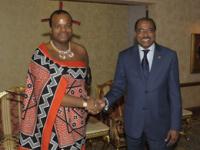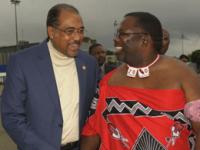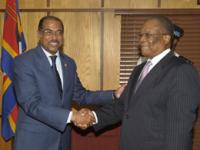
During his visit to Swaziland UNAIDS Executive Director Michel Sidibé met with His Majesty, King Mswati III. 15 February 2010.
Credit: UNAIDS/ Williams
UNAIDS Executive Director Michel Sidibé was in Swaziland on the first leg of a three-country tour of Southern Africa to gain insight on progress and challenges towards achieving the goals of universal access to HIV prevention, treatment, care and support. Mr Sidibé will be exploring options for joint action to intensify efforts to reduce new HIV infections.
Mr Sidibé met with His Majesty, King Mswati III, and commended him for his continued support to the AIDS response.
His Majesty, King Mswati III expressed his thanks to Mr Sidibé for highlighting the importance of AIDS in the country through his visit.
"I am deeply concerned about the tragic impact of AIDS on the people of Swaziland, especially on young people, families and children. We must ensure that children living with HIV, many of whom who have lost parents to AIDS, can live a full and healthy life," said His Majesty, King Mswati III.
We are committed to help change behaviour to stop new infections among our people.
His Majesty, King Mswati III
Swaziland has the highest rate of HIV prevalence in the world, estimated at 26% of the adult population in 2007.
Prevalence varies according to age and peaks for women in the group 25-29 where one in two women are living with HIV, whereas the age group with the highest HIV prevalence among males are those in the 35-39 bracket, with 45% living with HIV.

Michel Sidibé, UNAIDS Executive Director welcomed by the Honorable Minister of Health Dr Bennedict Xaba upon arrival to Swaziland, 14 February 2010.
Credit: UNAIDS/ Williams
Estimations show that three in every 100 people will be infected with HIV every year unless prevention efforts are stepped up. With this in mind, Mr Sidibé urged Swaziland to heed his call to ignite a prevention revolution with the aim of achieving zero new infections.
His Majesty, King Mswati III replied "We are committed to help change behaviour to stop new infections among our people. We all speak one language and have one culture, so we will work to ensure a stronger national response to this critical national programme."
“There is also tangible evidence of progress in the HIV response in Swaziland,” Mr Sidibé added. “This is particularly evident in the increase of numbers of people, notably pregnant women, who have access to treatment. Almost three out of four pregnant HIV positive women receive antiretroviral drugs to prevent transmitting the virus to their children. This is a significant achievement in Swaziland’s response to HIV,” he added.
There is tangible evidence of progress in the HIV response in Swaziland. This is evident in the increase of pregnant women who now have access to antiretroviral treatment.
Michel Sidibé, UNAIDS Executive Director
The two-day visit in Swaziland included a meeting with the country’s Prime Minister Dr Barnabas Sibusiso Dlamini. During the meeting, Mr Sibidé urged the Government of Swaziland to protect budget allocations to AIDS programmes.
Swaziland receives support from external donors towards the funding of its antiretroviral programmes. However dwindling support following the global economic downturn has also caused the Swazi government to cut back on all areas of social spending, including health.

UNAIDS Executive Director, Mr Michel Sidibé, meets with The Right Honorable Prime Minister, Dr Barnabas Sibusiso Dlamini, Swaziland, Mbabane, 15 February 2010. Credit: UNAIDS/ Williams
On his last day of his visit, Mr Sidibé met with civil society organisations, including representatives of groups of people living with HIV, women and youth organisations. He urged them to continue working closely with the government to help mobilize resources and achieve further successes in the response to HIV.






